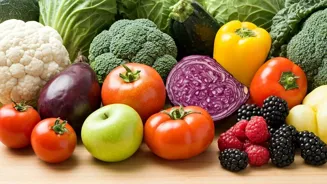Carrots and Vision
Carrots, a classic for eye health, contain high levels of beta-carotene, which the body converts into vitamin A. Vitamin A is vital for maintaining healthy
corneas and preventing age-related macular degeneration (AMD). AMD is a leading cause of vision loss among older adults. A regular intake of carrots helps keep the eyes healthy by reducing the risk of eye-related diseases. Carrots provide other beneficial compounds such as fiber and antioxidants that contribute to overall health. Eating carrots regularly can improve the night vision and ensure that your eyes are healthy from the early stages of life. Consuming carrots in various forms, like raw sticks, salads, or cooked dishes, can make it easier to include them in a regular diet, providing a tasty and effective way to support eyesight.
Leafy Green Power
Leafy greens like spinach, kale, and collard greens are packed with lutein and zeaxanthin, potent antioxidants that shield the eyes from harmful blue light and reduce the risk of AMD and cataracts. These antioxidants act like natural sunglasses, filtering out damaging light that can cause oxidative stress and cellular damage in the eyes. These nutrients accumulate in the retina, where they protect photoreceptor cells. In addition to their protective qualities, these greens are full of vitamins, minerals, and fiber that promote overall health. Adding leafy greens to your diet, either cooked, raw, or in smoothies, enhances eye health and contributes to a comprehensive approach to wellness. By incorporating these greens, you provide your eyes with crucial support for long-term health and clarity.
Citrus Fruits Boost
Citrus fruits, including oranges, grapefruits, and lemons, are abundant in vitamin C, a powerful antioxidant that fights free radicals and supports eye health. Vitamin C helps to maintain healthy blood vessels in the eyes, reducing the risk of cataracts and AMD. Eating citrus fruits can enhance the body's ability to absorb other nutrients and aid the process of cell repair. It also helps in maintaining the health of the retina and improving the visual field. Regularly consuming citrus fruits in fresh juices, as parts of meals or snacks will contribute to a diet that supports eye health. Including vitamin C will not only boost eye health but also will improve immune function and overall well-being. This proactive approach to diet can contribute to the long-term health of your eyesight.
Eggs for Eyesight
Eggs are a great source of lutein and zeaxanthin, essential nutrients that are concentrated in the macula, which helps maintain visual clarity. Eggs provide essential nutrients like zinc, crucial for macular health and reducing the risk of age-related vision loss. Zinc assists in the absorption of vitamin A, contributing to better vision in the dark. They also contain vitamin D, which is essential for eye health. Consuming eggs regularly is easy, as they are a versatile part of meals and are essential to include in daily meals. Eating eggs can provide necessary nutrients for eye health and improve overall well-being by supplementing the other important nutrients.
Nuts and Seeds
Nuts and seeds like almonds, walnuts, and flax seeds are loaded with vitamin E and omega-3 fatty acids, which are essential for good vision. Vitamin E protects the eyes from free radicals, preventing cellular damage that can lead to eye diseases. Omega-3 fatty acids support the health of the retina, reduce the risk of dry eye syndrome, and prevent cataracts. These nuts are easy to add to your diet. They are great as snacks and ingredients for salads. By incorporating nuts and seeds into your diet, you are supplying your eyes with crucial nutrients that will assist to protect them from the damage and promote a healthy vision. Regularly consuming nuts and seeds will contribute to overall health and enhance eye health.
Sweet Potatoes Benefits
Sweet potatoes are rich in beta-carotene, the precursor to vitamin A. They play a key role in maintaining good vision. Beta-carotene transforms into vitamin A in the body, which supports the health of the retina, and prevents dry eyes. Sweet potatoes are packed with vitamins, minerals, and antioxidants that promote general health. They are a great addition to any diet because of their delicious taste and versatility. They can be baked, mashed, or added to stews. Consuming sweet potatoes regularly will support eyesight and enhance your overall health. They are an easy and delicious way to ensure you receive enough essential nutrients.
Berries for Eyes
Berries, such as blueberries, strawberries, and raspberries, are packed with antioxidants, particularly anthocyanins. They are essential for protecting the eyes from damage. Anthocyanins fight oxidative stress and inflammation, reducing the risk of eye diseases such as AMD and cataracts. These berries improve blood flow and strengthen blood vessels, which is crucial for maintaining eye health. The consumption of berries can assist the body to protect itself from the damages that are associated with aging and environmental factors. Berries are easy to incorporate into your diet; they are great in smoothies, and are an excellent part of salads or snacks. Regularly consuming berries can help improve your eyesight and contribute to an overall healthier lifestyle.
Salmon for Eye Health
Salmon and other fatty fish, like tuna and mackerel, are rich in omega-3 fatty acids, essential for eye health. These fatty acids support retinal health and reduce the risk of dry eye syndrome and AMD. Omega-3s play a crucial role in preventing the onset and progression of these conditions. Additionally, salmon is an excellent source of vitamin D and other nutrients that support overall health. Consuming salmon improves the overall health, as it is one of the best ways to ensure your eyes are getting enough nutrients. Including salmon in your diet regularly can significantly improve your vision health.
Whole Grains for Vision
Whole grains, such as brown rice, quinoa, and oats, contribute to overall health and eyesight. They provide essential nutrients such as vitamin E and zinc, which support eye health. Consuming whole grains helps stabilize blood sugar levels, reducing the risk of diabetic retinopathy, which can cause vision loss. These grains are a great way to incorporate nutrients for eye health into your meals. Whole grains contribute to a balanced diet and can reduce the risk of chronic diseases. Incorporating whole grains into your diet can enhance your health and support a diet that promotes visual health. These grains are a practical and delicious way to maintain your health.
Water for Eyesight
Drinking enough water is essential for overall health, including eye health. Water helps keep the eyes hydrated, preventing dryness and discomfort, which can contribute to blurry vision. It also ensures the correct circulation of nutrients to the eyes, which helps them perform at their best. Water is important for maintaining healthy tear production, which protects the eyes from dust, debris, and other irritants. Proper hydration also affects overall health, helping to maintain clear vision. Consuming enough water is easy and critical to maintaining good eyesight. Making sure to drink enough water daily is a straightforward way to support your eye health.
























